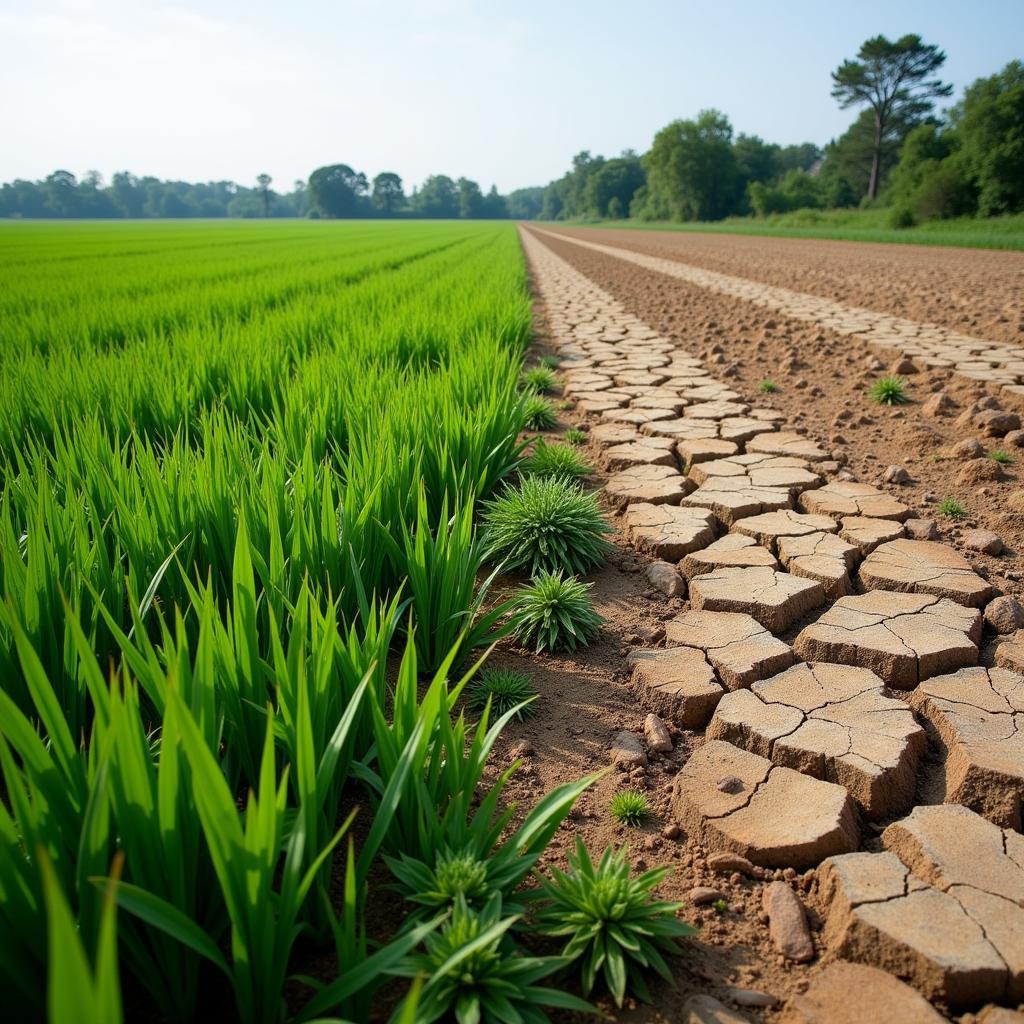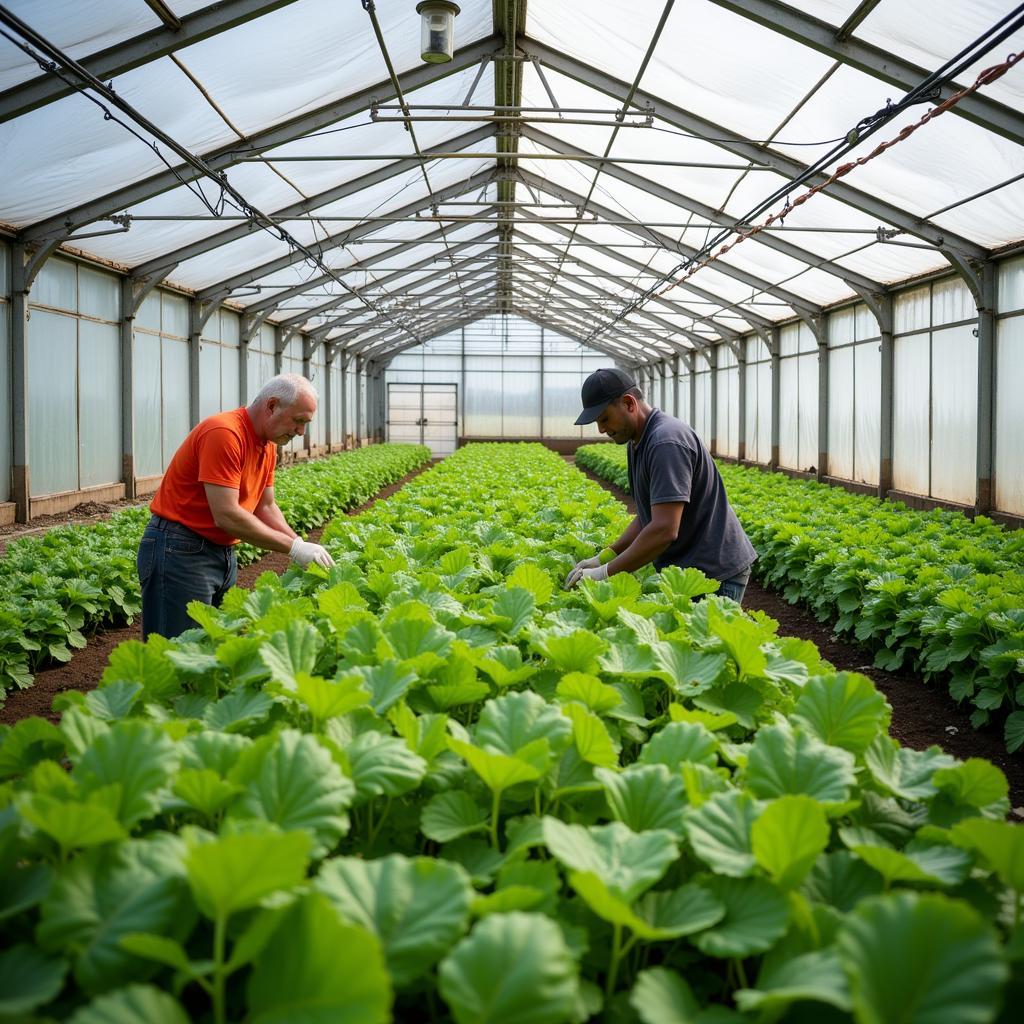Climate change and its effects on agriculture have become increasingly prominent topics in IELTS Writing Task 2. Based on analysis of past exam questions, this theme appears in approximately 15-20% of environment-related tasks, particularly in questions about global challenges or environmental issues. Let’s examine a recent exam question that exemplifies this topic.
 Climate change impacts on agriculture showing drought affected crops
Climate change impacts on agriculture showing drought affected crops
Topic Analysis
Some people believe that climate change is the biggest threat to agricultural productivity worldwide. To what extent do you agree or disagree with this statement?
This question requires candidates to:
- Take a clear position on whether climate change is the primary threat to agriculture
- Support their argument with relevant examples and evidence
- Consider possible counter-arguments
- Provide a well-reasoned conclusion
Band 8.5 Sample Essay
Climate change undoubtedly poses the most significant threat to global agricultural productivity, and I strongly agree with this assessment. The far-reaching impacts of changing weather patterns and increasing extreme weather events create unprecedented challenges for farming communities worldwide.
The primary reason why climate change represents such a fundamental threat is its comprehensive impact on crucial agricultural factors. Rising temperatures and altered precipitation patterns directly affect crop yields, soil quality, and growing seasons. For instance, in South Asian countries like India and Bangladesh, unpredictable monsoon patterns have severely disrupted traditional rice cultivation cycles, leading to significant crop failures. Similarly, prolonged droughts in agricultural regions of China have resulted in reduced grain production, threatening food security for millions.
Moreover, climate change creates a cascade of secondary effects that further compromise agricultural productivity. The increased frequency of extreme weather events, such as floods, hurricanes, and heat waves, can devastate entire harvests in a matter of days. For example, the recent floods in Pakistan destroyed vast areas of agricultural land, while unprecedented heat waves in Southeast Asia have led to widespread crop damage. These events not only affect immediate agricultural output but also have long-term implications for soil fertility and farming practices.
While other challenges to agriculture exist, such as soil degradation and water scarcity, these issues are often exacerbated by climate change. The global nature of climate change means that no region is immune to its effects, making it a uniquely pervasive threat. Farmers in Vietnam’s Mekong Delta, for instance, face both saltwater intrusion due to rising sea levels and irregular rainfall patterns, demonstrating how climate change compounds existing agricultural challenges.
In conclusion, climate change represents the most serious threat to agricultural productivity due to its comprehensive impact, global scope, and ability to intensify other agricultural challenges. This situation demands immediate international action to both mitigate climate change and develop resilient agricultural practices.
 Farmers implementing climate-adaptive agricultural techniques
Farmers implementing climate-adaptive agricultural techniques
Band 6.5 Sample Essay
I agree that climate change is a very big problem for farming around the world. It makes it harder for farmers to grow food and causes many problems for agriculture.
First, climate change makes the weather very unpredictable. When farmers don’t know when it will rain or how hot it will be, they cannot plan their crops properly. For example, in my country, many farmers plant rice at the wrong time because the rainy season doesn’t come when it used to. This makes their crops fail and they lose money.
Another problem is that climate change causes more natural disasters. Floods and droughts happen more often now, and these can destroy farms and kill animals. Last year, many farms in Indonesia were damaged by floods, and the farmers lost everything they had planted. This shows how dangerous climate change is for agriculture.
Also, warmer temperatures make it harder to grow some crops. Some plants cannot grow well when it is too hot, and new types of insects come that eat the crops. This means farmers have to spend more money on protecting their plants, and sometimes they still lose their harvest.
However, there are other problems that affect farming too. Things like poor soil and not enough water are also big problems. But I think climate change makes these problems worse and causes new problems too.
In conclusion, I believe climate change is the biggest threat to farming because it affects everything about how we grow food. Governments need to help farmers deal with climate change and try to stop it from getting worse.
Analysis of Band Scores
Band 8.5 Essay Analysis
- Sophisticated vocabulary and complex sentence structures
- Clear organization with well-developed ideas
- Specific examples from various countries
- Strong coherence and cohesion
- Effective use of topic-specific vocabulary
Band 6.5 Essay Analysis
- Simple but clear language
- Basic organization of ideas
- Some examples provided but less specific
- Limited range of complex structures
- Some repetition in vocabulary
Key Vocabulary
- agricultural productivity (n) /ˌæɡrɪˈkʌltʃərəl prɒdʌkˈtɪvɪti/ – efficiency of agricultural production
- precipitation patterns (n) /prɪˌsɪpɪˈteɪʃən ˈpætənz/ – rainfall distribution over time
- monsoon (n) /mɒnˈsuːn/ – seasonal changes in wind direction causing heavy rainfall
- cascade effect (n) /kæˈskeɪd ɪˈfekt/ – chain reaction of events
- saltwater intrusion (n) /ˈsɔːltwɔːtər ɪnˈtruːʒn/ – seawater moving into freshwater systems
- resilient (adj) /rɪˈzɪliənt/ – able to recover quickly from difficulties
- exacerbate (v) /ɪɡˈzæsəbeɪt/ – make worse
- pervasive (adj) /pəˈveɪsɪv/ – spreading widely throughout an area
Practice Suggestions
Consider practicing with these related topics:
- How can farmers adapt to changing climate conditions?
- Should governments provide more support to farmers affected by climate change?
- What role does technology play in addressing climate change impacts on agriculture?
Share your practice essays in the comments for feedback and discussion with other learners.


